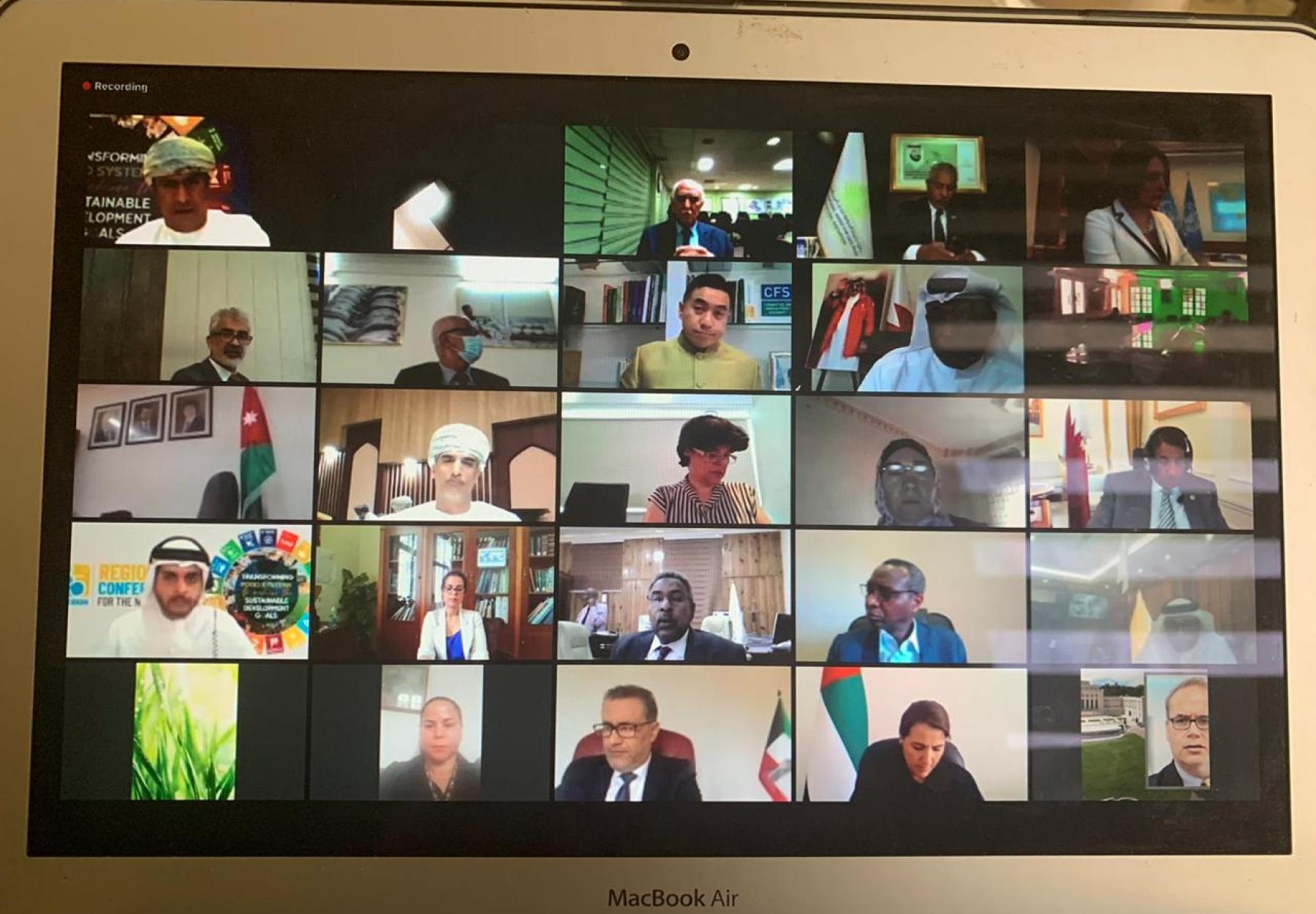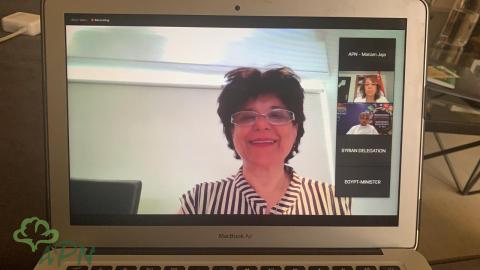
ANFS and APN took part in the ministerial meeting of 35th session of the FAO Regional Conference for the Near East (NERC).
The conference was held between 21-22 September 2020. It was attended by ministers of agriculture from Arab countries, representatives of partner organizations and UN agencies, and senior officials of member states to discuss regional challenges and priorities related to food security in the Near East and North Africa region.
ANFS and APN presented 14 recommendations at the conference. A top recommendation they made is to prioritize support for local food producers who are capable of supplying markets with products in a sustainable way. This can be done by securing the necessary resources for producers, such as land, seeds, and water, so they do not need to rely on international trade.
President of ANFS and Chairperson of the Board at APN Razan Zuayter stressed the need to reconsider the current mechanism of partnership between the FAO and civil society in the region.
She said that Arab countries must exchange agricultural production and knowledge with the presence of appropriate legislation that ensures this integration, which will encourage the cultivation of essential crops, such as wheat, barley, and corn, along with establishing containers to store stocks of them.
She also warned against the politicization of food aid which is used against the people rather than their benefit. She moreover called for an immediate end to the intrastate wars in the Arab region and the Israeli occupation of Palestine and its blockade of Gaza, and for preventing Israel from exploiting the current crisis to escalate attacks on the population and natural resources and confiscation of land.
The 14 recommendations:
The opening statement of the Arab Network for Food Sovereignty (ANFS) and the Arab Group for the Protection of Nature (APN) at the 35th session of the FAO Regional Conference for the Near East (NERC):
The COVID-19 pandemic revealed the fragility of food systems in the Arab region and the world. It has shown the dangers of current patterns of depletion and destruction of natural resources, the marginalization of local agriculture, and the violation of the rights of farmers, fishers, and agricultural workers. At the 35th session of NERC, ANFS affirmed its commitment to supporting food producers, such as farmers, fishers, shepherds, etc. in the Arab world. ANFS also stressed the need to fight for food sovereignty, and to guarantee the right to food through building nutritional systems for communities that are suffering to support their resilience in these times of crisis.
We call for a set of basic demands:
Giving priority to local food production that is capable of supplying markets with products in a sustainable way, through:
Providing the necessary resources to support food producers, such as land, seeds, and water
Relieving or alleviating farmers' debts and protecting them by establishing risk funds
Encouraging investments in the agricultural sector, especially in agricultural industrialization at the local level
Strengthening cooperative frameworks to allow small producers and farmers to access local markets
We have an opportunity today to reduce import and dependence on the international market, which has proven fragile in regional and global crises. Despite the opportunities that it provides to boost income, and foreign currency, reliance on international trade makes the agricultural sector and local farmers vulnerable to closing trade outlets and price fluctuations.
Establishing and activating legal frameworks and mandatory plans related to land use, allowing the preservation of agricultural lands and protecting them from attacks
Promoting the exchange of agricultural knowledge and production between Arab countries with the presence of appropriate legislation that guarantees this integration
Establishing a regional information bank for the agricultural sector to support planning and efficiency in the use of resources.
Strengthening national and regional food reserves in pursuit of food security. This can be done by encouraging the cultivation of essential crops, such as wheat, barley, and corn, along with establishing containers to store stocks of them.
Establishing local and regional seed banks and maintaining assets.
Supporting the fishing sector, especially small-scale fishers, by protecting their fisheries, securing markets for them, providing easy lending, and exempting them from taxes.
Enhancing livestock production while preserving the right of herders to access food sources.
Emphasizing the importance of research, development, and training in all agricultural fields, especially in frameworks for enhancing productivity, water management, ecological agriculture, the use of alternative energy and developing storage packaging, manufacturing, etc.
Evaluating the feasibility of promoting hydroponics at the expense of farming with soil at the national and regional levels, as its cost is high and requires large inputs. These conditions are challenging to achieve for most food producers, and the benefits of hydroponics need accurate scientific evaluation.
Directing government afforestation projects that aim to limit the effects of climate change towards forest species with added economic and food value, which achieve sustainable development for local communities and support the national economy.
Resist the politicization of food aid which is used against the people rather than their benefit.
Lifting of unfair international sanctions against some countries in the region. An immediate end to the intrastate wars in the Arab region and the Israeli occupation of Palestine and its blockade of Gaza, and for preventing Israel from exploiting the current crisis to escalate attacks on the population and natural resources and confiscation of land.
Implementing the Framework for Action for Food Security and Nutrition in Protracted Crises (CFS-FFA) which underwent a 3-year negotiation period by the Food Security Committee (FSC) at the headquarters of the FAO in Rome, and was ratified by all countries, including those in the Arab region.
Enhancing partnership, transparency, and accountability between government agencies, civil society organizations, and social movements.
